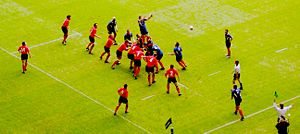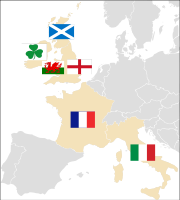Rugby - Past 6 Nations winners
The Six Nations Championship (referred to as RBS 6 Nations for sponsorship reasons), known before 2000 as the Five Nations Championship, is an annual international rugby union competition involving six European sides: England, France, Ireland, Italy, Scotland and Wales. The winner of the RBS 6 Nations is sometimes seen as being the European Champions
 The Six Nations Championship, with its predecessors the Five Nations and the Home Championship, is the premier international rugby union tournament in the Northern Hemisphere. It has also in the past been known as 'The International Championship'. There is also a Women's Six Nations Championship which historically featured Spain instead of Italy, but since 2007 has included Italy at Spain's expense.
The Six Nations Championship, with its predecessors the Five Nations and the Home Championship, is the premier international rugby union tournament in the Northern Hemisphere. It has also in the past been known as 'The International Championship'. There is also a Women's Six Nations Championship which historically featured Spain instead of Italy, but since 2007 has included Italy at Spain's expense.
In 1871, England and Scotland played the first rugby union international. After 12 years of occasional friendly matches between the teams, the inaugural Home International Championship, comprising England, Ireland, Scotland and Wales was played in 1883. England won the first series, along with a Triple Crown. Up until 1893, England and Scotland were the only champions, with Wales winning their first title that season. Ireland won their first title the following season. The 1908 and 1909 championships won by Wales, although won during the Home Nations era, could be regarded as Grand Slams, as they also defeated France both seasons.
 In 1910 the French, who had played in four of the tournaments up to that point, officially joined the competition and coined the phrase "Five Nations". England won the first championship of the new era, with the Welsh achieving the first Grand Slam the following year. The competition was suspended during World War I (1914-18). In 1931, France were ejected from the tournament, which reverted to being the "Home Nations" from 1932 through to 1939. The competition was suspended again during World War II (1939-1945). With France back in the competition, the Five Nations resumed in 1947, with a shared victory for England and Wales. France won their first shared title in 1954, and their first outright title in 1959.
In 1910 the French, who had played in four of the tournaments up to that point, officially joined the competition and coined the phrase "Five Nations". England won the first championship of the new era, with the Welsh achieving the first Grand Slam the following year. The competition was suspended during World War I (1914-18). In 1931, France were ejected from the tournament, which reverted to being the "Home Nations" from 1932 through to 1939. The competition was suspended again during World War II (1939-1945). With France back in the competition, the Five Nations resumed in 1947, with a shared victory for England and Wales. France won their first shared title in 1954, and their first outright title in 1959.
By the 1970s the Five Nations Championship had become the pre-eminent series in Northern hemisphere rugby union with matches becoming all-ticket affairs, gaining huge popularity and a large television audience. The 1972 tournament was not finished after Scotland and Wales refused to play in Dublin. The season after was unique for a five-way tie, with every nation having won and lost two games. The 1970s marked the golden age for Welsh rugby; winning three Grand Slams and one Triple Crown during the decade. Until 1993, there was no tangible reward for winning the Five Nations championship: there was neither flag nor cup or any other kind of trophy. However, for season 1992-93, there was presented, for competition, the Five Nations Championship Trophy.
 France were the first winners of the new trophy, followed by Wales and then England.
France were the first winners of the new trophy, followed by Wales and then England.
Scotland's first success came in season 1998-99; Ireland have yet to win it.
Scotland was the last nation to win the Five Nations Trophy as such because Italy joined the competition in 2000 and the tournament became known as the "Six Nations Championship".
England were the first nation to win the trophy under the new format, winning the 2000 competition.
The importance of the competition has decreased slightly since the introduction of the Rugby World Cup, but the long standing rivalries between teams mean that it remains a passionate and fiercely contested prize.
Anthems Used by the Teams
Even though God Save the Queen is the anthem of the United Kingdom it is only used by England in many sporting events; Wales has a separate national anthem. Scotland do not have an official anthem but usually Flower of Scotland is sung at sports events. The anthem for Ireland, whose rugby team represents two jurisdictions (the Republic of Ireland and Northern Ireland), have a specially commissioned anthem for rugby internationals; Amhr?n na bhFiann is also played at matches played in the Republic of Ireland.
- England: God Save the Queen
- France: La Marseillaise
- Ireland: Amhr?n na bhFiann, (plus Ireland's Call)
- Italy: Il Canto degli Italiani
- Scotland: Flower of Scotland
- Wales: Hen Wlad fy Nhadau
List of Six Nations Winners
Home Nations 1883?1909
| 1883 | England (Triple Crown) |
| 1884 | England (Triple Crown) |
| 1885 | Not completed |
| 1886 | England and Scotland |
| 1887 | Scotland |
| 1888 | Not completed |
| 1889 | Not completed |
| 1890 | England and Scotland |
| 1891 | Scotland (Triple Crown) |
| 1892 | England (Triple Crown) |
| 1893 | Wales (Triple Crown) |
| 1894 | Ireland (Triple Crown) |
| 1895 | Scotland (Triple Crown) |
| 1896 | Ireland |
| 1897 | Not completed |
| 1898 | Not completed |
| 1899 | Ireland (Triple Crown) |
| 1900 | Wales (Triple Crown) |
| 1901 | Scotland (Triple Crown) |
| 1902 | Wales (Triple Crown) |
| 1903 | Scotland (Triple Crown) |
| 1904 | Scotland |
| 1905 | Wales (Triple Crown) |
| 1906 | Wales and Ireland |
| 1907 | Scotland (Triple Crown) |
| 1908 | Wales (Grand Slam) |
| 1909 | Wales (Grand Slam) |
Five Nations 1910?1931
| 1910 | England |
| 1911 | Wales (Grand Slam) |
| 1912 | England and Ireland |
| 1913 | England (Grand Slam) |
| 1914 | England (Grand Slam) |
| 1915-19 | Not held due to World War I |
| 1920 | England, Scotland and Wales |
| 1921 | England (Grand Slam) |
| 1922 | Wales |
| 1923 | England (Grand Slam) |
| 1924 | England (Grand Slam) |
| 1925 | Scotland (Grand Slam) |
| 1926 | Ireland and Scotland |
| 1927 | Ireland and Scotland |
| 1928 | England (Grand Slam) |
| 1929 | Scotland |
| 1930 | England |
| 1931 | Wales |
Home Nations 1932?1939
| 1932 | England, Ireland and Wales |
| 1933 | Scotland (Triple Crown) |
| 1934 | England (Triple Crown) |
| 1935 | Ireland |
| 1936 | Wales |
| 1937 | England (Triple Crown) |
| 1938 | Scotland (Triple Crown) |
| 1939 | England, Ireland and Wales |
Five Nations 1940?1999
| 1940?46 | Not held due to World War II |
| 1947 | England and Wales |
| 1948 | Ireland (Grand Slam) |
| 1949 | Ireland (Triple Crown) |
| 1950 | Wales (Grand Slam) |
| 1951 | Ireland |
| 1952 | Wales (Grand Slam) |
| 1953 | England |
| 1954 | England (Triple Crown), France and Wales |
| 1955 | France and Wales |
| 1956 | Wales |
| 1957 | England (Grand Slam) |
| 1958 | England |
| 1959 | France |
| 1960 | England (Triple Crown) and France |
| 1961 | France |
| 1962 | France |
| 1963 | England |
| 1964 | Scotland and Wales |
| 1965 | Wales |
| 1966 | Wales |
| 1967 | France |
| 1968 | France (Grand Slam) |
| 1969 | Wales (Triple Crown) |
| 1970 | France and Wales |
| 1971 | Wales (Grand Slam) |
| 1972 | Not completed |
| 1973 | England, France, Ireland, Scotland and Wales |
| 1974 | Ireland |
| 1975 | Wales |
| 1976 | Wales (Grand Slam) |
| 1977 | France (Grand Slam) with the same fifteen players, the only time in a rugby championship |
| 1978 | Wales (Grand Slam) |
| 1979 | Wales (Triple Crown) |
| 1980 | England (Grand Slam) |
| 1981 | France (Grand Slam) |
| 1982 | Ireland (Triple Crown) |
| 1983 | France and Ireland |
| 1984 | Scotland (Grand Slam) |
| 1985 | Ireland (Triple Crown) |
| 1986 | France and Scotland |
| 1987 | France (Grand Slam) |
| 1988 | France and Wales (Triple Crown) |
| 1989 | France |
| 1990 | Scotland (Grand Slam) |
| 1991 | England (Grand Slam) |
| 1992 | England (Grand Slam) |
| 1993 | France |
| 1994 | Wales |
| 1995 | England (Grand Slam) |
| 1996 | England (Triple Crown) |
| 1997 | France (Grand Slam) |
| 1998 | France (Grand Slam) |
| 1999 | Scotland |
Six Nations 2000?present
| 2000 | England |
| 2001 | England |
| 2002 | France (Grand Slam) |
| 2003 | England (Grand Slam) |
| 2004 | France (Grand Slam) |
| 2005 | Wales (Grand Slam) |
| 2006 | France |
| 2007 | France |
| 2008 | Wales (Grand Slam) |
| 2009 | Ireland (Grand Slam) |
Women's Event
The Women's Six Nations Championship is run to the same schedule and on the same weekends as the men's competition. The first women's tournament Six Nations was in the 2002 season, though a Five Nations ran from 1999 to 2001, and a Home Nations tournament from 1996-1998.
The tournament included the same national teams as the men's competition did, with the exception that Spain took part instead of Italy. This continued until 2007 when, as a result of the formal adoption of the competition by the Six Nations Committee, Spain was replaced with Italy - purely in order to align both the women's and men's national team participants. Historically in women's rugby Spain had been a significantly stronger team than not only Italy, but had occasionally finished above Ireland, Wales, and Scotland in the tournament.
Finally, some more Six Nations trivia
- England were barred from the championship in 1888 and 1889 because of their stand over representation on the newly-formed International Rugby Board. In 1897 and 1898 the Welsh were made pariahs over a testimonial fund given to their captain and star player Arthur Gould. The neighbouring Unions regarded the presentation to Gould as an act of professionalism and Gould's retirement from international rugby eventually resolved the issue.
- Following the 1931 competition, France was expelled amid allegations of professionalism, the inadequacies of the French administration and concerns over on-field violence. France was readmitted following the 1939 competition, but World War II caused the suspension of the Five Nations until 1947. After the competition resumed, it remained the Five Nations for over a half-century. In 1972, the championship was abandoned as Wales and Scotland refused to play in Ireland after receiving threatening letters purportedly from the IRA.
- In 1996, a deal between British Sky Broadcasting and the Rugby Football Union meant that England home games were exclusively shown on Sky. This deal caused great controversy at the time and England were threatened with being expelled from the competition and being replaced by Italy. This threat was never carried out with the understanding that all future television deals would be negotiated collectively. Consequently, when the television rights became available once more, the rights to show all six nations matches in Britain went to the BBC.
- An outbreak of foot and mouth disease in Britain disrupted the 2001 championship; Ireland's matches against Wales, Scotland and England were postponed until the autumn.